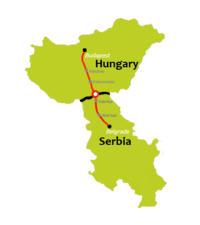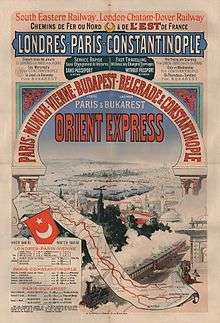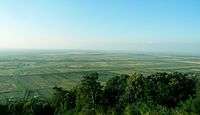Budapest–Belgrade railway
The Budapest–Belgrade railway is an important international railway connection between Central- and Southeast Europe. It connects the Budapest Keleti railway station, with the capital city of Serbia, Belgrade.

History

The railway line between Budapest and Belgrade was used also by the Orient Express until 1914. The Orient Express was running first time on the 5th of June 1883. It was connecting Paris and Constantinople.
Route description

Geography and landscapes
The railway line between Budapest and Belgrade passes mainly the Bács-Kiskun County and the Serbian Province of Vojvodina. The landscape is characterised by countless fields, dead straight highways and endless widths. [1]
Track condition
The outdated railway between Belgrade and Budapest will be modernised by Chinese companies. Starting from 2017 high speed trains could run on the 350 kilometers long connection. The travel time between the first and the final stop could be 2.4 hours. Nowadays it takes 8 hours.
The project, worth 1.5 billion Euros, is said to be implemented by Chinese companies. For modernizing 188 kilometers are estimated 885 million Euros. 370 million Euros are provided already, because of a Russian credit.
Based on earlier announcements the feasibility study and detailed construction plans should be provided until the middle of 2015, so that the modernizing works could start equally. [2] [3] [4]
References
- ↑ http://diepresse.com/home/panorama/donautour/1382721/Vojvodina_Eigensinnige-Provinz-an-der-Donau
- ↑ http://diepresse.com/home/wirtschaft/international/4621451/Chinesen-modernisieren-Bahnverbindung-BelgradBudapest
- ↑ http://hungarytoday.hu/cikk/china-finance-construction-new-budapest-belgrade-railroad-43460
- ↑ http://www.dailymail.co.uk/wires/reuters/article-2877403/Belgrade-Budapest-railway-Chinese-express-lane-Europe.html